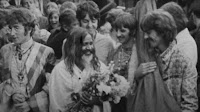The Beatles with Maharishi Mahesh Yogi
At the screening of his documentary, ‘The Beatles and India’, Ajoy Bose showed how the band’s visit to Maharishi Mahesh Yogi’s ashram helped export Indian classical music to the West.
At the screening of his documentary, ‘The Beatles and India’, Ajoy Bose showed how the band’s visit to Maharishi Mahesh Yogi’s ashram helped export Indian classical music to the West.
Ashutosh Anil Gudi
The Print
14 December, 2024
New Delhi: John Lennon was so distraught by Maharishi Mahesh Yogi’s betrayal that he wrote a song full of expletives directed at his former spiritual guru who introduced the West to ‘transcendental meditation’.
He wanted to call it ‘Maharishi’.
“The rest of The Beatles convinced him to rename the song to Sexy Sadie and tone it down,” said filmmaker Ajoy Bose at the screening of his 2021 documentary, The Beatles and India earlier this month at New Delhi’s India International Centre. “It had to be re-written, but it still carries the same sentiments; the lament that the Maharishi had everyone fooled.”
Bose, in his documentary, explores the cultural bridge between India and the West, which The Beatles along with Pandit Ravi Shankar and Maharishi Mahesh Yogi built together. They even visited the Maharishi’s Rishikesh ashram in 1968—but soon had a falling out over allegations that the Maharishi molested multiple women devotees including Mia Farrow.
The Maharishi also attempted to exploit The Beatles, referring to himself as their ‘spiritual teacher’ in a recording of his lectures. He also made a promise to the American Broadcasting Corporation that the group would be appearing in a television special without their consent.
The documentary shows how The Beatles’ visit to the ashram helped export not just Indian spirituality and yoga to the West, but also classical music. George Harrison incorporated the sitar in his music, in turn inspiring many artists and bands such as Donovan and The Mamas & The Papas.
“The Beatles were a very important part of my growing up in the ’60s. I was even commissioned to write a book on them by Penguin Random House because they wanted a fan account of them instead of an expert account. Writing my book and making this film had me really rediscover my favourite band,” Bose said. It’s a fascination he shares with the rest of the world.
The Beatles will never go out of style—and as Bose put it, “It goes beyond their music.”
Maharishi’s curse
The Maharishi’s cult status and the adulation from the West became a hotbed of intrigue. In Parliament, the Opposition alleged that the godman and his guests were in cahoots with the CIA to destabilise India. There was another rumour doing the rounds–that the Maharishi had cursed The Beatles, warning them that they would break up if they did not practice transcendental meditation.
Two years later, this came true. Bose, however, dismissed an audience member’s question on whether there was any truth to it.
“I think, for The Beatles, the time had already come before the curse. They were really all not together, and they had started fading away fast, and after 1967, everyone wanted to get out while only Paul wanted to stay,” he said.
He was impressed by their professionalism and commitment to their fans.
“They didn’t let their internal dynamics compromise their music.”
The infamous fallout between the godman and the idols made headlines all over the world. But it didn’t end there. French author Come Carpentier, who attended the screening, pointed out that over the years, there were attempts to mend the bridge, which Bose’s documentary also captures.
“There was a greater reconciliation because there was something higher than whatever transpired between The Beatles and the Maharishi,” he said.
“The Beatles essentially said that even though we made a mistake, this is what changed our lives and that is much better than whatever may have been said about the Maharishi.”
“This is the nature of India, and that is reflected very well in this film,” said Carpentier. “The legend of India remains no matter what is said about any guru, because there is something much higher about India than any individual’s behaviour, which is always affected by weaknesses such as those of the Maharishi,” he added.
Past and present, superimposed
The documentary is not rooted in the past. Through the film, Bose juxtaposes archival footage of The Beatles during their 1968 visit with present-day images of the locations.
A black–and–white scene shows the ‘Beatles Ashram’ in Rishikesh in ruins, followed by footage of John Lenon walking in the same landscape.
Bose explained that it was a superimposition of archival footage with recent images.
“We, in fact, had a special guy to do that. He had drawn this whole thing out, how exactly to do it. The editing team’s magic is behind this execution,” Bose said.
Incidentally, the ashram is slated for an overhaul to make it a tourist attraction.
Although The Beatles may have left the Maharishi and his ashram behind, Bose’s documentary shows that their romance with India ensured the country’s spiritual legacy found its rhythm in the global consciousness.
(Edited by Prasanna Bachchhav)
https://theprint.in/feature/around-town/john-lennon-wrote-song-expletives-maharishi/2402941/


No comments:
Post a Comment